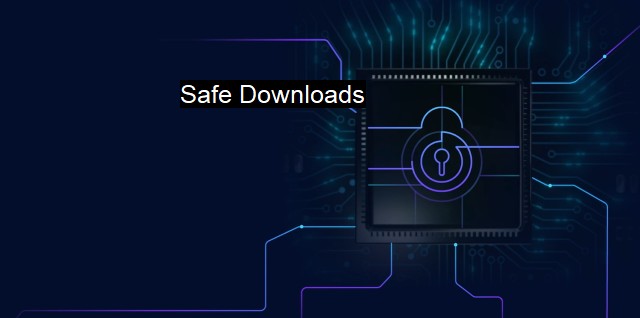What are Safe Downloads?
Ensuring Safe Downloads: The Role of Cybersecurity in Protecting Against the Growing Threat of Malware
In the sphere of cybersecurity and antivirus, "Safe Downloads" refers to the activities in which a user downloads files, documents, software, or any other form of data from the internet while ensuring minimal risk to their devices. Safe downloads essentially mean that the files or data that users download do not bring along any sort of malicious software such as viruses, malware, spyware, or ransomware that could pose substantial threats to their computers, networks, and overall cybersecurity. when referring to a safe download, it commonly signifies that the user is downloading a file that is free from copyright or any legality issues.The evolution of technology has made it remarkably easy for users to download items from the internet, albeit at a certain risk. Cybercriminals work diligently to introduce malicious software into users' devices via downloaded files, often including potent and harmful data breaches. A user could easily download and install malware unintentionally, and this is where the concept of safe downloads comes to light.
Safe downloads are a crucial part of maintaining cybersecurity. Computer users must maintain vigilance when downloading, ensuring that they only download data and files from reputable sources. It is also essential to keep antivirus software updated to provide protection against potential threats. This software can scan downloads in real-time and provide an alert if they detect any threats.
Understanding the type of a file can further assist in safer downloads. Different file types have varying potential for containing malware. executable files (.exe, .bat, .cmd, .pif) could interact with the system and hence, the hackers target them frequently. Hence, users should be careful while downloading these files, especially from an untrusted source.
Another example of safe downloads often overlooked by many users is the usage of secure connections, such as those provided by HTTPS protocol, indicated by a lock symbol in the address bar of most browsers. The "s" in HTTPS stands for "secure," indicating that all communications between your browser and the website are encrypted, reduces the chances of download interception or alteration, thereby providing additional safety.
Safe downloads mean ensuring the files that users download are devoid of privacy risks. When a user downloads a software or application, they might be inadvertently granting privacy permissions to the downloaded software. By checking the permissions and reading through the terms of service, users can make sure the downloaded software or application does not access or collect more data than it requires.
Practicing safe downloads does not just end with the downloading process. It is also vital to maintain regular system scans post-download, which can ensure that a suspicious application has not escaped the antivirus system. Regular scans offer an additional layer of security and form an important part of secure computer use.
To sum it up, safe downloads imply a set of vigilant measures to ensure that the data, files, or software being downloaded do not infringe on a user's cybersecurity or privacy. Awareness, antivirus software, secure connections, understanding file types and safe sources, and regular system scans form the building blocks of safe downloads in the context of cybersecurity and antivirus protection. Therefore, to create a robust line of defense against malware and other various threats, downloading safely—with precautions in place—is essentially non-negotiable.

Safe Downloads FAQs
What are safe downloads?
Safe downloads refer to the process of downloading files or software without the risk of malware or viruses that could potentially harm your computer or online security.What steps can I take to ensure safe downloads?
To ensure safe downloads, it is recommended to always download software or files from reputable sources, use antivirus software to scan downloads before opening them, and never open or download suspicious or unfamiliar files.Do I really need antivirus software for safe downloads?
Yes, antivirus software is an essential tool for safe downloads as it can help detect and block any potential threats before they can harm your computer or compromise your online security.What should I do if I accidentally download something harmful?
If you accidentally download something harmful, immediately disconnect your device from the internet and run a full scan with your antivirus software. You may also need to seek professional help to fully remove any malware or viruses that may have infected your device.| | A | | | B | | | C | | | D | | | E | | | F | | | G | | | H | | | I | | | J | | | K | | | L | | | M | |
| | N | | | O | | | P | | | Q | | | R | | | S | | | T | | | U | | | V | | | W | | | X | | | Y | | | Z | |
| | 1 | | | 2 | | | 3 | | | 4 | | | 7 | | | 8 | | |||||||